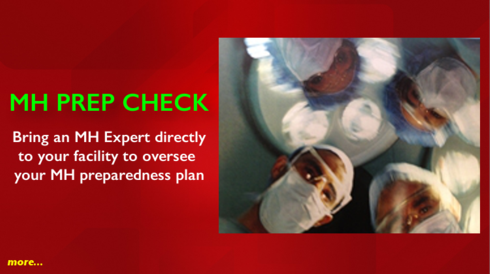![[Image: masthead]](/mhau001/includes/themes/MHAUS_2016/images/masthead/masthead-large.png)
Outside NA: 001-209-417-3722
FOR EMERGENCIES ONLY
Malignant Hyperthermia Syndrome -- an International Problem
May 2008
Malignant Hyperthermia Syndrome -- an International Problem
At the end of May many of the world's researchers and experts in the study of MH will gather in Lund, Sweden as part of the annual European MH Group meeting (see their web site at www.EMHG.org). The meeting will last three days and consist of updates and laboratory and clinical research and prospects for the future regarding MH.
This reminds me that MH is indeed an international problem and not limited to specific ethnic or religious groups. Wherever MH has been looked for, it has been found.
MH was first described in Australia by Dr. Michael Denborough and his colleagues at the Royal Melbourne Hospital in the early 1960s. The syndrome was given its name by Dr. Robert Gordon, Chair of Anesthesiology at the University of Toronto in Canada. The first International Workshop on MH was held in Toronto, Canada and organized by Drs. Beverly Britt, Gordon and Werner Kalow in 1971. The proceedings were published in book form.
One of the first conferences related to MH in the U.S. was held in Wausau, Wisconsin in 1974 and the proceedings published in book form in 1977. Subsequent symposia have been held in Colorado, Pennsylvania, Japan, Germany and other countries. The studies that led to the identification of the gene responsible for MH in swine were conducted in Canada at the University of Toronto, although a good deal of research was also underway at the University of Minnesota. Dantrolene was discovered by Dr. Keith Ellis working at Norwich Eaton Pharmaceuticals in Norwich, NY (near the MHAUS Administrative Offices in Sherburne, NY). However, proof of its efficacy was demonstrated by Dr. Gaisford Harrison in South Africa.
The first MH organizations were developed in the United Kingdom, where some of the first diagnostic biopsies were performed by Dr. Richard Ellis' group and in the U.S. (MHAUS). A group of Japanese anesthesiologists and investigators were holding annual MH symposia through the 1990s. Publications, including books, seminars and courses on MH have been held in North and South America, Australia and New Zealand, Japan, Europe and Scandinavia.
In addition to the work done to clarify the presentations and management of MH, deaths from MH have been reported from all around the world as well. Although the mortality from MH is very low in Western or Westernized countries, anecdotes suggest a higher mortality in other countries. In some cases, countries do not have access to dantrolene. In others, they do not have adequate monitoring equipment and in still others, education and training related to MH is lacking.
We at MHAUS have been anxious to educate as many people as possible as we can in every country in how to recognize, treat, manage and advise family members in regard to MH. That's why we post just about all our material on the web and make it available without charge in most instances.
In 1992, MHAUS produced a roundtable discussion video in English, French, Italian, German and Portuguese concerning the latest advances in MH. We have posted some material in Spanish on our web site as well. The North American MH Registry of MHAUS receives data from other countries. However, I must acknowledge that we can and should do a lot more in terms of getting the word out about MH. Translation of our material into other languages would certainly help, but that is costly both in terms of time and money.
We would like to assist those in other countries who are interested in producing educational material and will provide our material free of charge for them to translate and disseminate.
Thanks to technology, the world has shrunk and sharing of information is not the problem it was. Furthermore, with the advent of "medical tourism", many Americans and Canadians are seeking medical care and surgery in other countries that have developed hospitals and clinics that meet the rigorous standards of the accreditation organizations such as the Joint Commission.
Those of you who may be reading this and who need assistance in developing an MH organization or just providing information concerning MH to patients and providers in your country, MHAUS stands ready to assist you.
We can do this in several ways: We can provide you with material that you are free to translate into your own language. We can establish "back office " functions to maintain a database of patients and providers. We can assist and advise in going about establishing an MH organization. We can even, in some cases, suggest speakers or provide material for those interested in delivering talks and lectures on MH.
My vision for MHAUS is that it becomes part of an international organizational effort to eliminate death and disability from MH. Please let me know your thoughts on this subject.
- General
